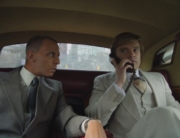Even if you just know two-term Brazilian president Luis Inácio Lula da Silva from photo ops with Bono, Obama, Bill (Gates), you don’t have to be up on Brazilian politics to be on firm and familiar ground. The tone of Fábio Barreto’s biopic strongly contrasts with that other new film of a real-life politico, the union-buster and take-no-prisoners Margaret Thatcher of The Iron Lady. Meryl Streep’s intimating take on Thatcher will make a grown man soil his pants; de Silva, who goes by Lula, will offer you a bear hug and a beer instead. (Both leaders rose to prominence roughly in the same era).
Lula’s script takes a well-trodden and straightforward road, beginning with da Silva’s humble upbringing in the impoverished Northeast. He and his seven siblings were raised by an illiterate mother (the noble Glória Pires) abandoned by her philandering husband. His family became part of the massive migration to the urbanized south in the 1950s, where da Silva scraped by as a shoe shiner and fruit vendor in his Horatio Algiers-like determination to defeat adversity. Based on the biography Lula, the Son of Brazil by Denise Parana, the movie sticks to da Silva’s formative years up to his leadership of the Steel Workers’ Union during the military dictatorship (he was imprisoned for 31 days). By concentrating on his hardscrabble life and the tight mother/son bond, the filmmakers assume the viewer has some knowledge of his politics.
For its first half, Lula moves along with brio and avoids the quicksand that sinks many of its ilk. By showing and not relying on telling, the narrative steers clear of explicit exposition, though not the archetypes of the saintly and wise mother and the abusive, drunk, deadbeat dad, who times his outbursts to best humiliate his young son. Then Lula grows up (into newcomer Rui Ricardo Diaz) and joins a factory assembly line, and the film settles into a time-honored pattern: young love, loss, and social unrest. The script ends up giving in to the genre’s tropes, beyond his mother’s platitudes—misfortune waits around the corner whenever his luck seems too good to be true.
In a film filled with incidents, not ideas, da Silva’s mostly reactive, and when he makes a decision, like calling off a long-standing strike, he does so almost apologetically. Undeniably, the film has a soft spot for its subject. The fawning epilogue states, “Lula is already considered one of the most important politicians in the history of Brazil and one of the great world leaders of our time.” (In a world of lists, Newsweek ranked him as the 18th most important person on the planet in 2008.) But da Silva comes across as such a nice and sensible guy that you’re likely to crave the ego-driven rants or the paranoia running rampant in other political biopics, or, just for the sake of drama, clamor for a more biting or challenging point of view.






Leave A Comment